Cleveland Clinic News Service | 216.444.0141
We’re available to shoot custom interviews & b-roll for media outlets upon request.
CCNS health and medical content is consumer-friendly, professional broadcast quality (available in HD), and available to media outlets each day.

Colorectal cancer is the third most common cancer diagnosed in both men and women in the United States. According to cancer.org, about 1 in 22 men and 1 in 24 women are at risk of developing colorectal cancer in their lifetime.
Colorectal cancer is the number two cause of cancer-related deaths in the United States, even though it’s one of the most preventable and treatable forms of cancer, if caught early.
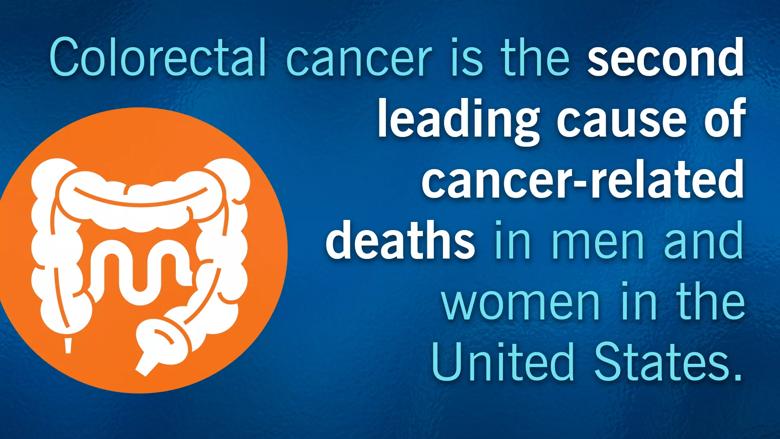
Image content: This image is available to view online.
View image online (https://assets.clevelandclinic.org/transform/9fca218b-3ec4-4eea-be4e-9bc102759515/18-CCC-245-colorectCncrSecond-1920x1080_jpg)
Source: CDC
“In younger patients, who are typically not eligible for screening colonoscopies, we are discovering more and more colorectal cancer in those patients,” said Dr. Khorana, colorectal cancer oncologist at Cleveland Clinic. “Not only are the incidence rates going up – that’s been previously reported – but mortality rates in the 20 to 54-year-old population are also going up.”
Related: Colon Cancer Deaths on the Rise for Younger Adults
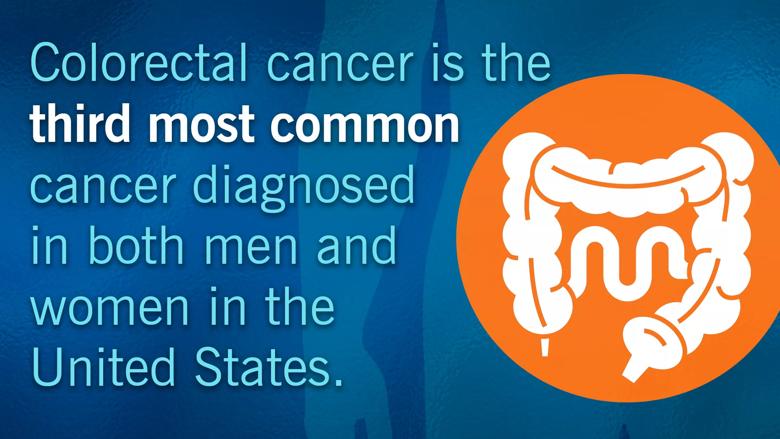
Image content: This image is available to view online.
View image online (https://assets.clevelandclinic.org/transform/51754a73-4585-4219-9d90-1620645f7403/18-CCC-245-colorectCncrThird-1920x1080_jpg)
Source: CDC
A Cleveland Clinic colon cancer risk assessment survey found that respondents who exercised more, followed a healthy diet and did not smoke were less likely to have a personal history of colorectal cancer or colon polyps. Read more about the study results here: Online Survey Finds Colorectal Cancer Reported More Commonly in Individuals with Unhealthy Lifestyles; Screening Underutilized
Related: Nearly Half of Cancer Deaths Linked to Unhealthy Behaviors
Know your family history
Up to 30 percent of colorectal cancer patients have a family history of the disease. Five percent of all cases of colorectal cancer are hereditary, where a mutated gene causes the cancer and can be passed down from a parent to a child.
Lifestyle and nutrition
You may be at increased risk for developing colorectal cancer if you drink alcohol, use tobacco, don’t get enough exercise, and/or if you are overweight. Smoking increases the risk of precancerous polyps and colorectal cancer, as does obesity. A diet high in fat and calories and low in fiber, fruits and vegetables has been linked to a greater risk of developing colorectal cancer.
What you eat plays a big role in colorectal cancer risk. “We’ve known that high-fiber diets can decrease the risk of colorectal cancer. New research is shining the spotlight on whole grains,” says Anna Taylor, a registered dietitian at Cleveland Clinic.
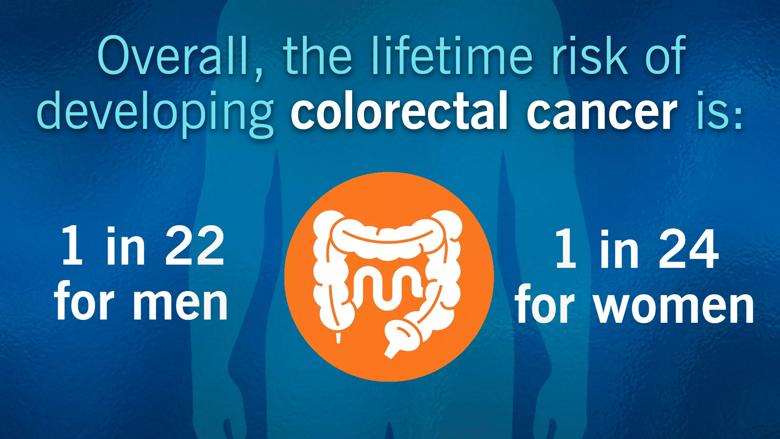
Image content: This image is available to view online.
View image online (https://assets.clevelandclinic.org/transform/afd86ff0-37ac-475a-99a2-606d256f03a9/18-CCC-245-colorectCncrRisk2-1920x1080_jpg)
Source: CDC
Recent research indicates that an Enhanced Recovery After Surgery (ERAS) protocol — that permits patients to eat before surgery, limits opioids by prescribing alternate medications, and encourages regular walking — reduces complication rates and speeds recovery. It can reduce blood clots, nausea, infection, muscle atrophy, hospital stay and more.
Video content: This video is available to watch online.
View video online (https://www.youtube.com/embed/2B9WrtZFePw?feature=oembed&wmode=transparent)
Related: No. 8 Medical Innovation for 2018: Enhanced Recovery After Surgery (Video)
Minimally invasive surgery to treat rectal cancer
While it is still early in the evolution of transanal total mesorectal excision (TaTME), the technique is gaining traction as the go-to procedure in select cases, Cleveland Clinic colorectal surgeons report.
Young Mom Diagnosed with Rectal Cancer After Colonoscopy
Annie is one of a surprising number of people in the 20- to 54-year-old population who have been diagnosed with colon or rectal cancer in recent years. Dr. Steele, from our Department of Colorectal Surgery, used a minimally invasive surgical procedure called TaTME that eliminated the need for a permanent colostomy bag.

Image content: This image is available to view online.
View image online (https://assets.clevelandclinic.org/transform/4429d18f-6eca-4fa9-a9e3-173be50bef97/annie-colon-cancer-month-tease-02142018_jpg)
Source: CDC
Endoscopic Submucosal Dissection (ESD): A cutting-edge surgical technique that removes flat polyps
“The incidence of flat polyps hovers around 10 percent. Still, they too often go undetected and unrecognized simply because they are, literally, flat,” says colorectal surgeon Emre Gorgun, MD.
Specialized Procedure Saves Woman’s Intestine
Meet a woman determined to beat a challenging type of polyp with a cutting edge technique.
Video content: This video is available to watch online.
View video online (https://www.youtube.com/embed/PNlBMzXbEvs?feature=oembed&wmode=transparent)
Clinical trials
Colorectal cancer clinical trials help us discover new treatment options for patients. Many colorectal cancer patients have good outcomes because of past clinical trials that have uncovered new treatments and approaches. One colorectal cancer clinical trial we offer at Cleveland Clinic is a national study that aims to treat cancer based on its DNA.
Related: Search cancer clinical trials
Patient stories
Because of Cleveland Clinic’s multidisciplinary team approach to colorectal cancer treatment that includes collaboration among surgeons, medical oncologists and radiation oncologists, a stage 4 colon cancer patient survives and thrives after the cancer had spread to multiple organs in her body.
Additional patient stories available upon request.

Image content: This image is available to view online.
View image online (https://assets.clevelandclinic.org/transform/0dddaf41-bb4f-4575-9125-daf2fbfa88ed/Sohal_Davendra_jpg)
Davendra Sohal, M.D. colorectal cancer medical oncologist

Image content: This image is available to view online.
View image online (https://assets.clevelandclinic.org/transform/dacba3de-9048-43f6-ba87-bd5e63933848/Taylor_Anna_jpg)
Anna Taylor, RD, registered dietitian
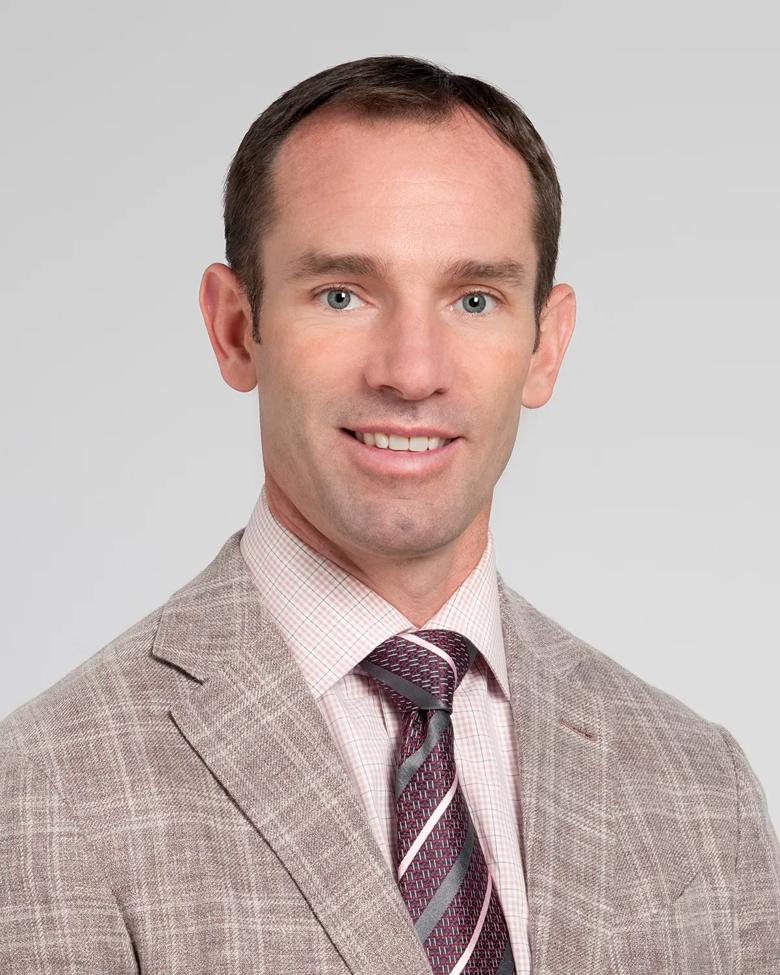
Image content: This image is available to view online.
View image online (https://assets.clevelandclinic.org/transform/92d8d57b-30ce-435d-ba19-2e172aa982db/Scott-Steele-MD_jpg)
Scott R. Steele, M.D., Chairman of the Department of Colorectal Surgery
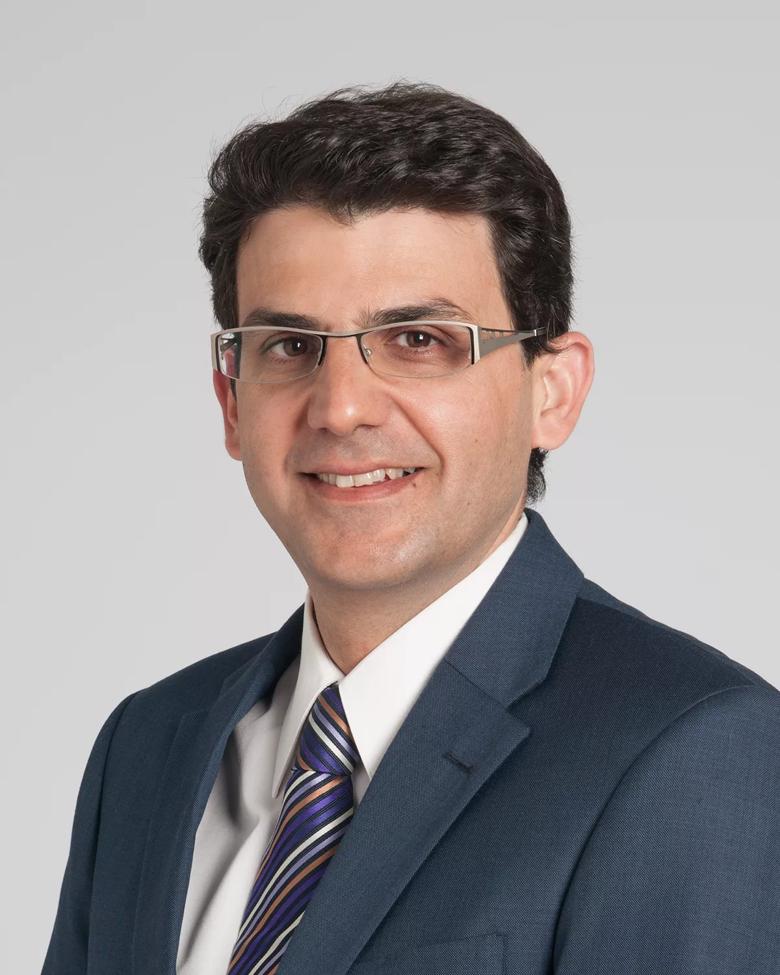
Image content: This image is available to view online.
View image online (https://assets.clevelandclinic.org/transform/3e611451-bfc4-4fcf-bc21-bb82fd41d20a/Gorgun_Emre_715203_jpg)
Emre Gorgun, M.D., colorectal surgeon

Image content: This image is available to view online.
View image online (https://assets.clevelandclinic.org/transform/1740c4c9-ad38-4b0e-8d0d-b591bcde19f3/Krishnamurthi_Smitha_409318_jpg)
Smitha Krishnamurthi, M.D., colorectal cancer medical oncologist

Image content: This image is available to view online.
View image online (https://assets.clevelandclinic.org/transform/78d5248d-fdd4-4f68-ba3a-648320f9b044/Shepard_Dale_CleveClinic_jpg)
Dale Shepard, M.D., colorectal cancer medical oncologist

Image content: This image is available to view online.
View image online (https://assets.clevelandclinic.org/transform/b03c5123-7863-493c-9efb-39aef0aee791/Khorana_Alok_876095_jpg)
Alok Khorana, M.D., colorectal cancer medical oncologist
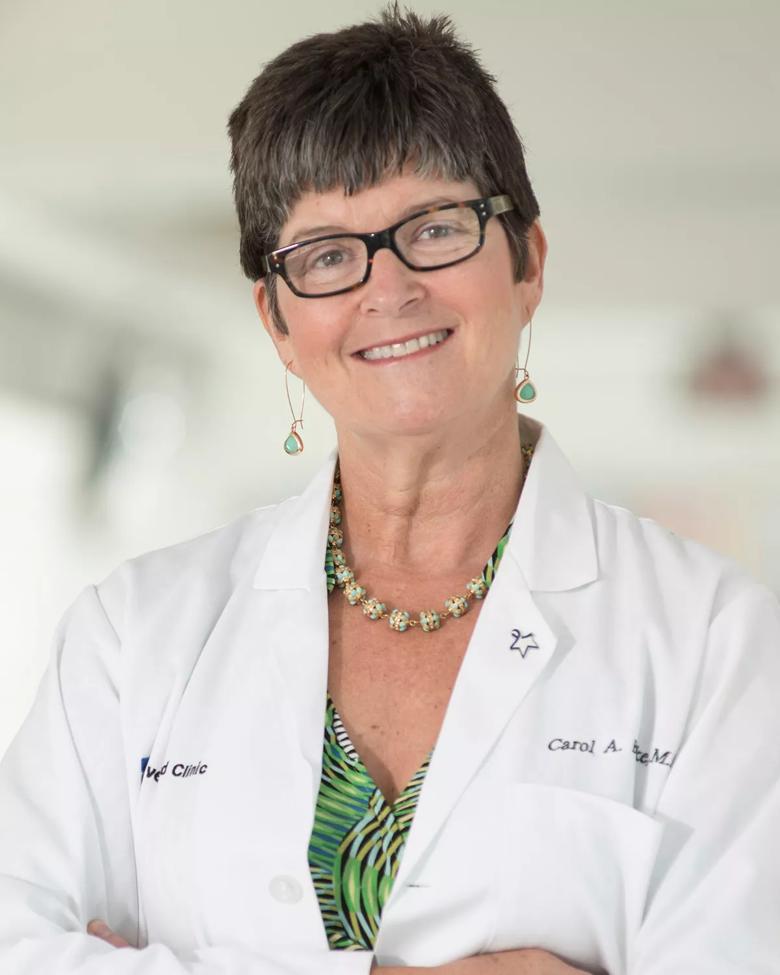
Image content: This image is available to view online.
View image online (https://assets.clevelandclinic.org/transform/1f86b87c-30b5-4a7a-897e-0611564a7b3b/116144_Burke_08-24-16_038_ST_jpg)
Carol Burke, M.D., hereditary colorectal cancer specialist
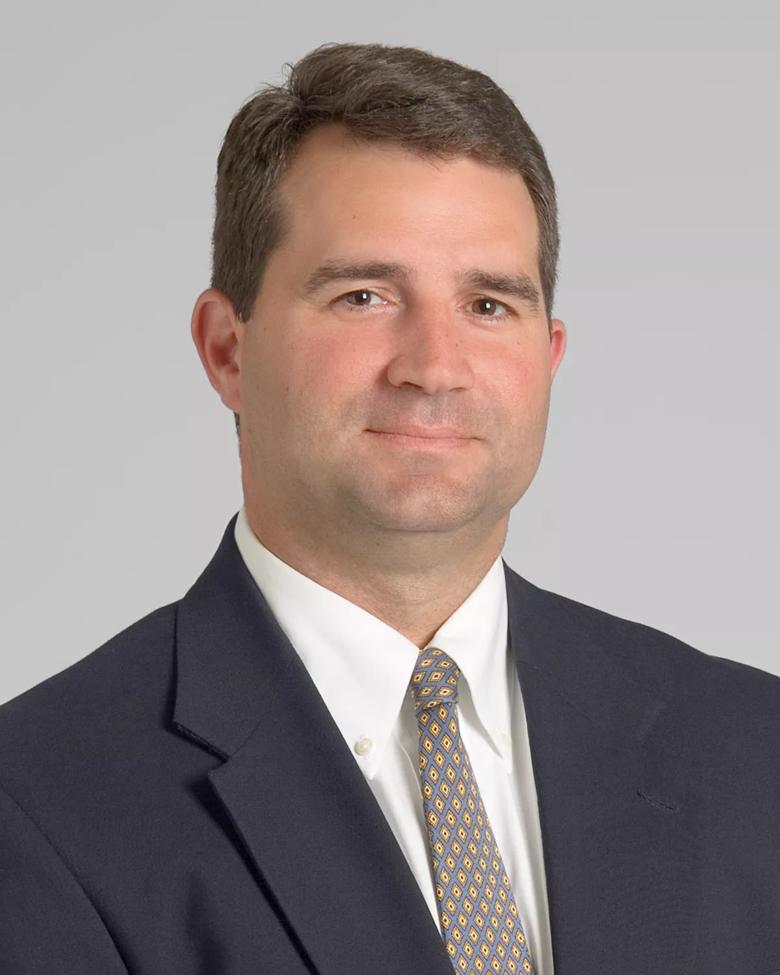
Image content: This image is available to view online.
View image online (https://assets.clevelandclinic.org/transform/ad6242c0-6fce-4a4c-97b0-2f1919a9b442/Kalady_Matthew_728160_jpg)
Matthew Kalady, M.D., Co-Director of the Cleveland Clinic Comprehensive Colorectal Cancer Program
Cleveland Clinic is a nonprofit multispecialty academic medical center that integrates clinical and hospital care with research and education. Located in Cleveland, Ohio, it was founded in 1921 by four renowned physicians with a vision of providing outstanding patient care based upon the principles of cooperation, compassion and innovation. Cleveland Clinic has pioneered many medical breakthroughs, including coronary artery bypass surgery and the first face transplant in the United States. Cleveland Clinic is consistently recognized in the U.S. and throughout the world for its expertise and care. Among Cleveland Clinic’s 82,600 employees worldwide are more than 5,786 salaried physicians and researchers, and 20,700 registered nurses and advanced practice providers, representing 140 medical specialties and subspecialties. Cleveland Clinic is a 6,728-bed health system that includes a 173-acre main campus near downtown Cleveland, 23 hospitals, 280 outpatient facilities, including locations in northeast Ohio; Florida; Las Vegas, Nevada; Toronto, Canada; Abu Dhabi, UAE; and London, England. In 2024, there were 15.7 million outpatient encounters, 333,000 hospital admissions and observations, and 320,000 surgeries and procedures throughout Cleveland Clinic’s health system. Patients came for treatment from every state and 112 countries. Visit us at clevelandclinic.org. Follow us at x.com/CleClinicNews. News and resources are available at newsroom.clevelandclinic.org.
Editor’s Note: Cleveland Clinic News Service is available to provide broadcast-quality interviews and B-roll upon request.